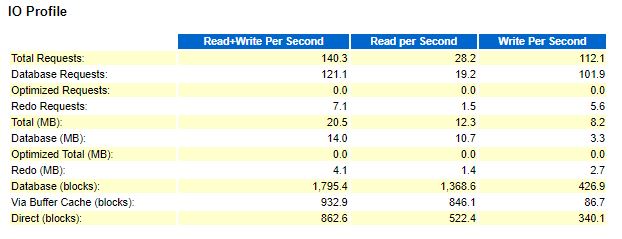After viewing CPU Usage and Redo Size statistics, here's a look at the I/O Profile.
Here's the header which indicates that this AWR report is for duration of 2hours on 19c on Windows :
Instead of the Load Profile, this time I will skip directly to the I/O Profile section :
In the above table, "Database" seems to include both "Datafile" and "Tempfile".
Also, for some co-relation, the IOStat section :Here we can see a break-down of the I/O Profile. I am more interested in the *Writes*.
From the previous post, we've already seen that 20GB of writes were for Duplexed Online Redo Logs and 10GB for ArchiveLogs.
But what about the rate per second ?
Online Redo Log file writes were 2.7MB/second.
Datafile + Tempfile writes were 3.3MB/second. Note that Tempfile I/O was higher than Datafile I/O.
Although Datafile requests per second were higher, Datafile writes by DBWR may well be in smaller batches (i.e. fewer blocks at each write) --- more I/O calls (85.59), less total written bytes (1.388M). This is in the nature of DBWR behaviour as DBWR periodically "collects" dirty buffers to flush to disk.
Writes to Tempfile for Sort/GroupBy operations (10.59 for 1.89M) can be more blocks per call. This is because such operations can consist of large number of blocks in each sesssion. The writes are from PGA, not the Buffer Cache in the SGA.
So, what could have been happening here, that Tempfile writes were so high, relative to Datafile writes ? Sort Operations, Group By Queries, Create / Rebuild Index operations.
Note : Create / Rebuild operations are unlikely to be all visible in the SQL Statements section of the AWR report because, as DDL statements, they get invalidated and aged out of the Shared Pool quickly before each AWR Snapshot run. Yet, their I/O profile is visible in the IO Sections of the AWR Report).
Create/Rebuild Index operations do not generate Redo for their Tempfile writes but *do* generate Redo for their Datafile writes if they are not executed as NoLogging operations.



No comments:
Post a Comment